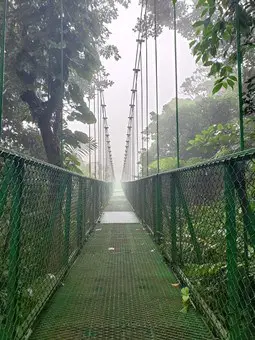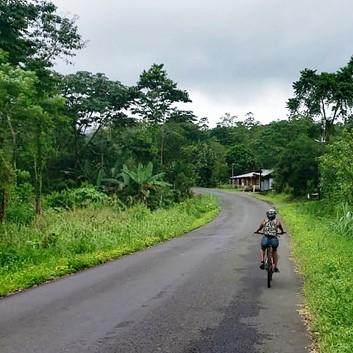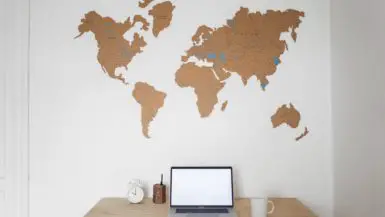Social media portrays digital nomads as perpetual travellers working in mesmerising locations, enjoying a lifestyle that others could only dream of. However, moving around frequently, the lack of social ties, and being alone for long periods, can be a lonely life for some.
I’ve spent a significant amount of time alone growing up and as an adult due to circumstances, and I enjoyed it for the most part. However, I suffered from anxiety, and during such periods I tended to isolate myself excessively which resulted in some lonely times. Even after leaving my full-time job to travel and start a new life with my long-distance boyfriend (now partner), I had to actively try not to isolate myself too much. Unfortunately, the ongoing pandemic and the travel restrictions have isolated most people in general.
Along the way, I acquainted with the loneliness that faced other travellers and nomads, and each person had unique experiences around the subject. So, I’ve made some suggestions below to assist in handling loneliness based on my personal experiences and what I’ve learnt from others.
Accept that it’s OK to feel lonely (every now and then)
Society may think that digital nomads are on a continuous vacation, that they have it all sorted out, and have discovered true happiness. Hence, you may feel pressured to live up to these standards, and even feel ashamed of anything contradictory. I’ve personally felt bad about feeling bad.

It’s important to be kind to ourselves. It’s not abnormal to feel lonely or feel low every now and then. You’ll also miss your former life at times, perhaps even the things you wanted to get away from, which can lead to feeling isolated and lonely. I missed the daily commute to work in public transport, as crazy as it sounds! More importantly, you may miss your family, friends, or other social circles you were a part of. If you are feeling lonely, you’ll need to address it and make some adjustments to your lifestyle, but it isn’t something to be ashamed of or feel guilty about.
Stay in touch with your close circle
Maybe you have a few close friends, or a close family. Consider having routine calls when everyone can participate from across time zones, or individual calls if that’s your preference. If this is difficult to coordinate, you can use another method such as a routine email update. Sometime ago, one of my friends in New Zealand started a “Friday Five” email among a small group of friends. Every Friday, we shared five things from the week that made us happy (or sad), and sometimes these were the little things we wouldn’t have reflected on ordinarily. This became one of our most looked-forward to activities on Friday, and we grew into a close circle during that period.
Keeping in touch with non-judgemental friends or family (if you have them), will make you feel loved and connected, despite the distance. If loneliness is an issue, you can even talk to them about it. The people who know you the most may be able to assist in your specific situation.
Make new connections
It could be that some of your old friends or family members are too busy with their lives, or that you don’t have anything in common anymore. But there are other like-minded people to be found, so, be open to new connections.
Consider joining online digital nomad communities and social media groups. Given the ongoing pandemic, more people are online. You can join specific groups for certain segments of digital nomads including females, digital nomads within certain countries or cities.
Use coworking spaces within the existing guidelines. If you miss the camaraderie in your old office environment, then coworking spaces will be a welcome substitute. You can also network and build connections this way.
Try co-living if that suits you. You may find people to spend your leisure time with and may make some friends too.
Research the expat groups and communities in the respective areas. In non-pandemic times, there may be specific group events for writers, artists, cyclists, hikers, and dancers, among others.
Research volunteer projects if that’s of interest. It’s another great way to meet people with similar interests. If you are passionate about ocean-life for example, you may meet like-minded individuals at beach clean-ups.
>> Read more: A guide on meeting people as a digital nomad.
Choose locations that suit your requirements
Try to choose places you’ll be comfortable living in. For example, if you prefer coworking spaces, then ensure you travel to places where such facilities are available. Some people may find it comfortable to be in countries where they speak the language.
If you are feeling lonely, stay in areas that won’t aggravate such feelings. You would have an idea of what triggers certain feelings.
Consider having a base or staying longer in one place
Moving around frequently can make it harder to build social ties. It can also become exhausting sometimes. So, consider having a remote base to travel out from, or maybe you can stay longer in each place you travel to. Many countries have digital nomad visas which will allow you to stay in a place for a year or more. My partner and I chose Mexico as a base which gives us some stability while being able to move around easily.
Staying longer in a place will help you establish and grow new relationships. It takes time to get to know people.
Take some time off

It’s important to take a break and reflect. Is the loneliness disrupting your daily life? Do you need professional help? What lifestyle changes can you make to feel better?
Digital nomads work while they travel and aren’t tourists. So, don’t feel guilty about taking a break. Organize your schedule in a way that you can take some time off every now and then, with no distractions including social media. Maybe you can spend time in nature without devices or go on a short retreat.
Include some socializing, networking, and long-distance calls, into your calendar. If you work extra-long hours and don’t engage in any other activities, you may increasingly feel isolated and lonely.
Keep active and learn new skills
Are there any skills you may need in the future, or any existing skills you need to refresh? If you are in a country that speaks a different language, that’s a great opportunity to learn something new. Language exchange sessions online and offline are also great ways to meet people.
If you enjoy physical activity (and even if you don’t as much), try to get active. Consider joining community events around physical activities such as dance classes, cycling days, and swimming events. Even if such events are cancelled due to the pandemic, you can still go for a walk, a run, or a bike ride on your own or with someone else.
Staying active and engaged in activities outside work will help you learn some skills, become healthier and have a more fulfilling life in general.
Consider why you want to (continue to) be a digital nomad

What attracted you to this lifestyle? How did you feel in your pre-digital nomad life? Are you happy to continue as a digital nomad? Weigh the positives and the negatives of your lifestyle. You don’t have to be a nomad forever. You can always choose a place to live for a while or even for the long term.
Being alone doesn’t have to equal loneliness. You can have hundreds of people around you and still feel lonely. In the end, it’s about the meaningful relationships we have with others and with ourselves.
If being a digital nomad is what you really want, try to make some changes to address loneliness and any other concerns, while living the dream!
Disclaimer: I am not a mental health professional. This article is for general information purposes only. If you are experiencing any mental or physical health issues, please see a medical professional.







Leave a reply